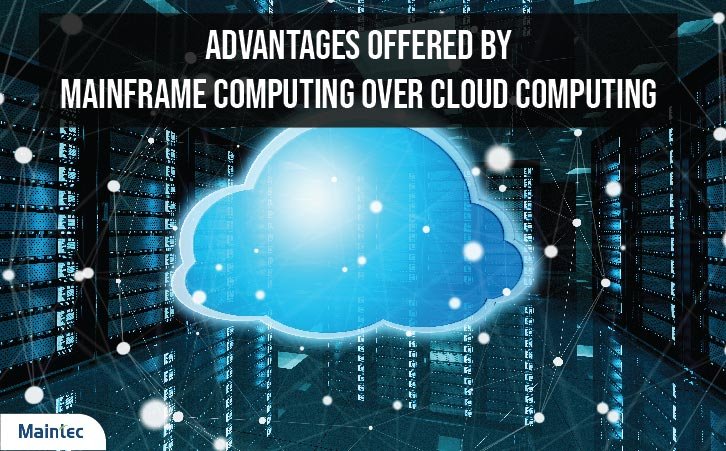

Advantages Offered by Mainframe Computing Over Cloud Computing
Let’s begin by assuming mainframes were the original cloud computing platform. Those who have worked on mainframes for some time may recall a time when mainframe services and processing power were “sold” to other departments inside a company in order to turn IT into a profit center.
It has been a long journey, since the initiation of cloud computing in the industry. No matter with all the up-gradation and new evolved and technological advancement for the processes that take place, security still holds the top priority moderator of the rising cloud computing adoption. So it will be a wise decision to develop and build your cloud computing platform on a strong industrial-based power which provides agility, scalability, and a secure foundation.
“Shadow IT” is a crucial issue that many organizations are dealing with. When divisions within a business use cloud apps but the central IT staff is oblivious of what they’re undertaking, this is known as shadow IT. This would not function in a mainframe setting.
Migrating to the cloud is frequently promoted as a cost-cutting measure. Mainframes are frequently thought to be costly. Of fact, many consumers are unaware that mainframe systems require significantly fewer employees to run applications and services than non-mainframe platforms, resulting in significant cost savings. Only a portion of the savings goes into hardware and software. Only in the case of mainframes do all of these expenses appear on the same budget page.
Advantages Offered by Mainframe for Cloud Computing
For cloud computing, the mainframe services have various advantages. The following are some of the most important benefits to consider:
Scalability
For all the data warehouse, production processing, data analytics, and enterprise web applications mainframe is the perfect platform to support billions of transactions and processes of the users without any hindrance and provide outstanding performance.
Flexible Infrastructure
The z/VM operating system that executes the virtual servers, hypervisors, blade servers, and logical partitions(LPARs) that are being evaluated on common criteria EAL 5+ are highly secured virtualized environments with cloud implementation that are supported by system z.
Centralized Data Hub
Up to two-thirds of organizational performance data remains or derives on the mainframe, according to statistics. This means that private clouds running on System z have secure access to critical data that may be accessed if required, with access controls, encryption, data security, data masking, and integrity in place.
Compliance
Data encryption, separation of tasks, privileged user monitoring, secure communication protocols, audit reporting, and other industry standards, compliance rules, and best practices are all supported.
Resilience
The modernized mainframe provides the top resilient platform with the highest level of availability, reliability, recoverability, security, agility, flexibility, integrity, and performance.
Security
By implementing the mainframe private cloud, it offers one of the industry’s best controls with the maximum level of security transparency to have access across the enterprise. The security risks associated with public clouds with open networks can also be reduced by using mainframe clouds.
Migration
The distributed workloads may easily be transferred to the virtualized mainframe environment, reducing the number of distributed systems that need to be administered.
Consolidated workloads
Once the virtual environment on the mainframe has been optimized, consolidating the workload becomes simple while maintaining any required segmentation between virtual systems. This also helps to lower the licensing costs associated with distributed systems.
Reduced Total Cost of Ownership
According to ease of security management research, the total cost of ownership (TCO) for a private cloud based on IBM zEnterprise systems over three years was comparatively lower than a third-party service provider’s public cloud. To be benefited from all the benefits and advantages that one can reap from cloud computing, along with navigating the most priority concerns and security with lowering the risk. one will select the platform equipped with secure architecture, data protection controls, application security, operating system integrity, hardware protection, and virtualization isolation.
However, rather than entirely revamping your platform, you can tackle the challenge of choosing between the mainframe and the cloud by modernizing the mainframe systems, which entails making incremental enhancements or progressively adding functionality to existing core systems. Modernization should be ongoing so that replacement is minimized and current systems’ functionality is preserved. With mainframe applications being updated along with contemporary web service-based interfaces, updating apps or expanding functionality is less expensive and can be done more quickly.
When it comes to digital transformation, it’s best to keep your options open as much as possible, because the entire process necessitates flexibility and agility. There is, however, a method to have the best of both worlds. The correct mix of on-premise mainframes and cloud platforms could be the key to powering an organization that can shift as quickly as the computing world evolves—which is to say practically instantly.
Taking advantage of each platform’s best features would be a prudent line of action.
